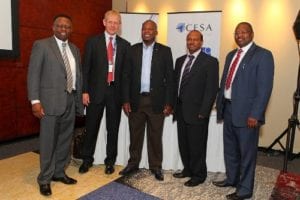The annual Consulting Engineers South Africa (CESA) conference was held in Cape Town late last year. A scene of lively debate and challenging questioning, the conference saw some real issues being tackled and an awareness that change is coming.
The diverse programme began with then incumbent CESA president, Naren Bhojaram, leading the way by wresting the conference theme, ‘Leadership – key to sustainability’, and digging deep into what this actually means for the industry. Unapologetic, Bhojaram placed the living of values in all matters above any talk, promises or agreements. While mindful of how he phrased his message, he pulled no punches: sustainability means making tough calls in an environment where only the strong and principled can be tolerated.
Bhojoram was followed by the deputy mayor of Cape Town, Ian Neilson, who picked up the topic and ran with it, citing the development of Cape Town as clearly based on leadership and tough measures.
Walking the sustainable walk
Abe Thela, president of CESA, is a man of refined logic and used this quality to walk delegates through CESA’s recommendations to its members on achieving cross-enterprise sustainability. Integrating sustainability must be done methodically and it is proposed that all of CESA’s member firms prepare a simple sustainability report as part of their annual declaration documentation.
Due to the need to contextualise sustainability within the consulting engineering framework, a steering committee was formed, and based on their findings, a meaningful reporting protocol was developed that should guide member companies through the process.
The fundamental components of CESA’s sustainability model are a simple road map for any company to follow:
- acknowledge: what is the company’s responsibility in terms of sustainability
- define: what areas are important to the company
- apply: apply the reporting process
- participate: ensure a comprehensive representation of all the company’s stakeholders are included and participate
- stock taking: annually review sustainability in material terms.
The constituents of a CESA Sustainability Report include:
Organisational profile: core business and services; and location of enterprise and all economic, environmental and social charters, principles or other initiatives to which the organisation subscribes. Because this model is based on components rather than process, each member company is able to properly shape it for relevance.
Sustainability strategy overview: signed policies, description of material sustainability issues, organisation’s objectives and targets, and stakeholder engagements.
Acknowledging CESA Sustainability Indicators: indicator one is education, indicator two is economic and political certainty, indicator three is jobs, indicator four is to eradicate corruption and indicator five is responsible development.
Thela was clearly encouraging all CESA members to integrate sustainability across their businesses, with reporting protocols and a mechanism of reflection that would ultimately lead to the relevant mind shifts necessary to see organisations walking the sustainability walk.
Leadership – the key to sustainability
Thabo Masombuka, CEO of the Construction Sector Charter Council, gave a powerful address, focusing on sustainability from an enterprise point of view, and put leadership at the heart of transformation.
The import of Masombuka’s message emerges from the Construction Sector Code, which is unambiguous in its message. The key purpose of the code includes:
- the inclusion of black women in the ownership and management ofconstruction companies andbusinesses
- the acceleration of technical skills and capacity of black youth, disabled persons and providejob and employment opportunities
- building the entrepreneurial capacity and sustainability of emerging black enterprises in the construction sector
- the creation of sustainable jobs and long-term employment opportunities in the rural and urban areas where construction project are being rolled out
- creation of an environment in which there is economic inclusive growth and representative construction sector.
The code seeks to facilitate transformation in areas such as racial and gender composition of ownership, control and management, the advancement of employment equity, skills development that is correctly targeted and the development of a an entrepreneurial culture. Not all of these points, it could be argued, are in harmony with each other, and they are a cause for ongoing debate.
The Construction Sector Charter Council seeks to produce what it calls a ‘Baseline Report’. The key elements to establish include a factual and substantive annual report to the Department of Trade and Industry, from which barriers to transformation can then be identified and isolated, and overcome.
When gold comes swarming
Jason Drew was the guest speaker on the opening day, and he brought with him a truly innovative story of sustainability.
Unashamedly a capitalist, Drew left the corporate world and found a completely new way of forging a sustainable career. Drew has turned to Mother Nature to find his direction and calls himself an eco-capitalist. Taking recycling to a whole new level, Drew looks to natural waste in sewage, manure and abattoir blood to find his pot of gold. Noting the immense volumes of nutrient-rich waste being discarded each and every hour in each and every corner of our planet, Drew wondered if oneman’s junk was another man’s riches. Taking the natural lifecycles as his road map, he wondered if he couldn’t capitalise on it and took his first steps towards industrialising fly farming. He has succeeded wonderfully, and this eco-industrialist has a lot to teach us all.
The panel discussions
The panel discussions were a welcome format, and it was refreshing to see CESA choose this effective format instead of simply relying on the presentation of papers. There were three panel discussions in total: Enterprise Sustainability, Environmental Sustainability, and the National Development Plan and Special Infrastructure Projects.
National Development Plan
Trueman Goba cuts an impressive figure in the world of consulting engineering – and business in South Africa in general. His overview of the National Development Plan was an important feature of the conference and made the distinct impression that South Africa could, given the right impetus, be on the threshold of taking itself to the next level as a nation and as a leader on the African continent.
Farewell to Naren Bhojaram, welcome to Abe Thela, CESA President 2014
This year’s conference saw the end of Naren Bhojaram’s term as president of CESA. Bhojaram took up his presidency in 2011, just a year after those heady days of the World Cup. From day one, hewalked a clear line of support for initiative by the South African government to minimise and eliminate corruption, while being tough and realistic about the intense damage it is doing to South Africa. Bhojaram has not wavered from this stance in his two years as president and his direct approach has been responsible for the cultivation of robust and honest criticism, debate and action – not least of which was the establishment of a fund and a hotline for the reporting of corruption in the world of construction.
The healthy criticisms and debate that emerged at this year’s conference can be rightly attributed to the culture of openness and honesty he has sought to promulgate. Bhojaram, formerly director of Royal HaskoningDHV for Southern and Eastern Africa, has since been appointed director of Rivers, Deltas and Coasts at the company.
An extremely accomplished individual, he is a mentor at Business Unity South Africa and is a former chairperson of the South African Netherlands Chamber of Commerce. Despite the incredible demands on his time, Bhojaram’s passion for uplifting disadvantaged communities through education has seen him actively promoting community upliftment projects and establishing the Saturday School for previously disadvantaged school students – a concept has recently been extended to coach juvenile inmates in correctional facilities to enable them to achieve their matric whilst incarcerated.
IMIESA congratulates Bhojaram for the impact he has made both during his presidency of CESA and throughout his career.
It is with immense pleasure that
IMIESA welcomes Abe Thela, a director at Nyeleti Consulting, as the new president of CESA. Thela (BEng) is a Professional Engineer who has specialised in municipal engineering for many years. A man of utmost integrity, heis known to be extremely generous with this time, which is highly valuable, given hisincredible work ethic and multitude of commitments.







